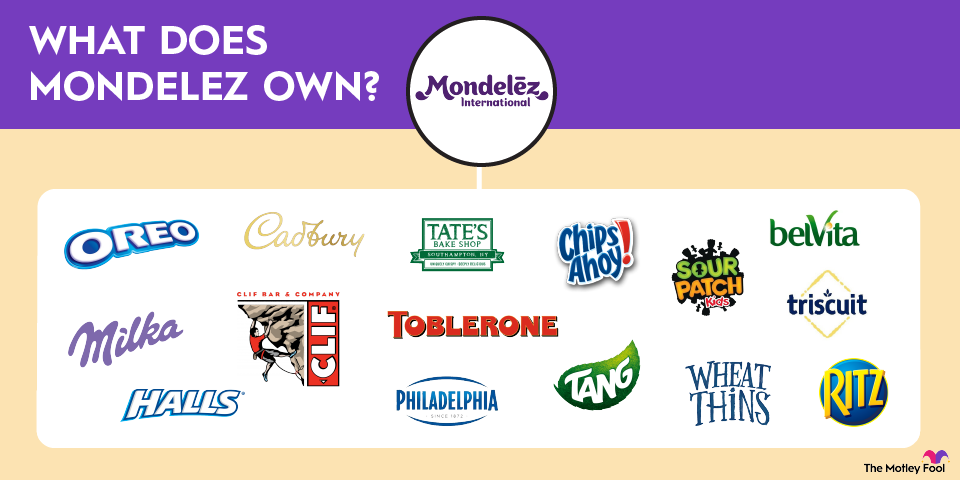Mondelez International (MDLZ +0.58%) is a global snacking giant with a treasure trove of beloved brands. The company was formed in 2012 when Kraft Foods Group spun off its grocery business into what's now Kraft Heinz (KHC -0.11%). It retained its snack food business and rebranded it as Mondelez, which derives its name from words meaning "world" and "delicious."
Mondelez holds the No. 1 global position in biscuits (cookies and crackers) and is the No. 2 player in chocolate behind Mars. It has a growing baked snacks portfolio and makes and sells candy, various cheese and grocery items, and powdered beverage products for certain markets.
The company has steadily expanded its brand portfolio over the years. It has made 10 acquisitions since 2018, growing its core categories and expanding into adjacent ones. Here's a look at some of the top companies Mondelez owns and the ones the food stock might consider acquiring next.

What companies does Mondelez own?
Mondelez owns several companies across the following categories: biscuits (sweet and savory), chocolate, cakes and pastries, and snack bars. It owns several iconic global brands that generate over $1 billion in annual sales, as well as several regional favorites with strong local market positions. Some of its top-selling brands include:
Oreo
Oreo is the top-selling global cookie brand, generating more than $1 billion in annual sales for the company. Oreo's history dates back to 1912 when Nabisco introduced the sandwich cookie. Kraft Foods acquired Oreo when it merged with Nabisco in 2000 in a $14.9 billion deal. The brand became part of Mondelez when Kraft spun off its grocery business in 2012.
Ritz
Nabisco introduced Ritz crackers in 1934. Mondelez acquired the brand after Kraft bought Nabisco in 2000 and subsequently spun off its grocery business in 2012.
Chips Ahoy!
Nabisco introduced the Chips Ahoy! chocolate chip cookies in 1964. Like many of its top-selling brands, Chips Ahoy! came to Mondelez through Kraft's acquisition of Nabisco in 2000.
Clif Bar
Mondelez acquired Clif Bar & Company in 2022 for $2.9 billion. The deal added Clif, Luna, and Clif Kid to the company's global snack bar business. The acquisition created a global snack bar player with $1 billion in annual sales.
Cadbury
Cadbury's history dates back to 1824. The brand features the Cadbury Egg, Cadbury Dairy Milk chocolates, Flake, Wispa, Twirl and Eclairs chocolates, and Cadbury Bourneville drinking chocolate.
Kraft Foods bought Cadbury in 2010 for almost $20 billion. At the time, the deal created a global snack, confectionery, and quick meal powerhouse. Cadbury stayed with Mondelez in 2012 when Kraft spun off its grocery business.
Mondelez is the undisputed leader in biscuits (sweet and savory), with a dominant 17.4% market share of the $125 billion global market. It could acquire additional companies in this space, as it did in 2021 when it purchased Gourmet Foods to enter the fast-growing premium and well-being cracker market in Australia and New Zealand.
The company's next acquisition in the biscuit market could be another dominant local brand. For example, it could seek to acquire Britannia Industries, a leader in the Indian biscuit, bread, and dairy products market.
Mondelez also holds a strong market position in the chocolate industry. It's currently slightly behind Mars, at 12.3% of the $134 billion market. It most recently bought Mexico's leading confectionery company, Ricolino, for $1.3 billion in 2022 to expand its global share. Its next deal could vault it past Mars. Potential acquisition options include Storck, Pladis, Lotte, and Ritter Sport.
While Mondelez has the third-largest market position in the cakes and pastries category, it has only a 3.8% share of the $97 billion market. It has worked to strengthen its position by making a couple of acquisitions in recent years.
In 2022, it bought Chipita Global, a high-growth leader in the Central and Eastern European croissants and baked snacks category. Meanwhile, in late 2024, it purchased a significant majority of Evirth, a leading manufacturer of cakes and pastries in China. It also made a strategic investment in "better-for-you" doughnut start-up Urban Legend in late 2024.

Given its relatively small share of the massive market, it seems likely that Mondelez will continue to make acquisitions in this category to capture a larger share of the large, fragmented market.
Its many potential acquisition opportunities include brands from large players, such as Grupo Bimbo (which sold Ricolino to Mondelez). It could also buy a company like McKee Foods (maker of Little Debbie snacks, Drake's Cakes, Fieldstone Bakery snacks and cereal, and Sunbelt Bakery granola and cereal).
Mondelez also holds the third-largest position in the snack bars category, at 9.1% of the $19 billion market. It has made three deals over the past few years to build its position, including its 2022 purchase of Clif Bar.
Many of its top competitors in this category, such as Kind and Larabar, are owned by larger food companies (Mars and General Mills (GIS -0.45%), respectively). However, potential acquisition opportunities are out there, such as the fast-growing healthy snacking company That's It.
Although acquisitions are a core aspect of its growth strategy, Mondelez will also sell noncore brands to enhance its approach. For example, in late 2023, it sold its gum brands in developed markets, including Trident, Dentyne, and Chicklets in the U.S., along with several European brands.
It retained its gum business outside the U.S., Canada, and Europe, including Stride in China and all its other candy brands and products. The sale gave it the funds to accelerate the growth of its core chocolate, biscuits, and baked snacks categories.
Related investing topics
The bottom line on companies Mondelez owns
Mondelez owns some of the most iconic snacking brands, like Oreo, Cadbury, and Ritz. The company has also acquired several brands over the years, most recently Clif Bar, Ricolino, and Chipita. It expects to continue acquiring brands in the future as it grows its core categories and expands into adjacent ones.
Future deals will help further accelerate its growth. Mondelez believes this will enable it to create more value for shareholders who buy and hold stocks over the long term, which could make it a good stock investment.
FAQ
About the Author
Matt DiLallo has no position in any of the stocks mentioned. The Motley Fool recommends Kraft Heinz. The Motley Fool has a disclosure policy.






















